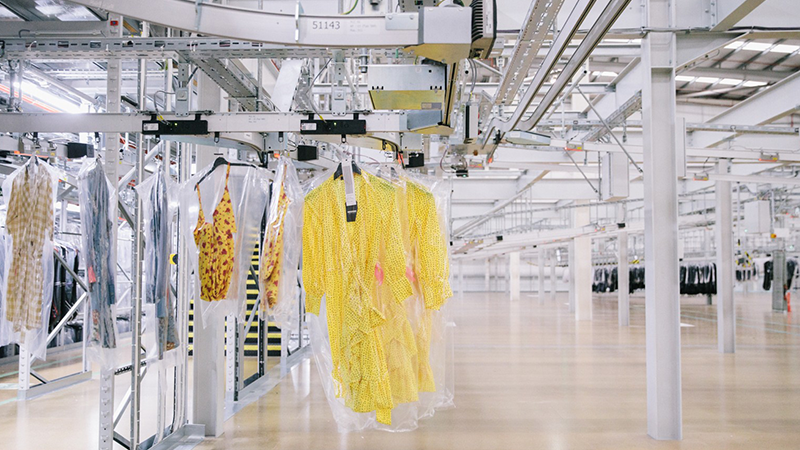21 July 2021

As part of our ongoing member and business guest blog series, ACS Clothing has written about the challenges facing the fashion industry and their views on how to drive an authentic circular approach.
Redirecting the focus of fashion
As sustainability remains the word of the moment and consumers continue to vote with their wallets in a bid to save our planet, brands are listening and being reactive in their response. Whilst some fashion brands are investing in R&D to design out waste in their future collections, others are introducing innovative circular business models like rental clothing or resale in the form of pre-loved, second-hand collections.
As the industry evolves to meet consumer demands, it can’t be forgotten that consumerism and fast fashion as an ethos is now so ingrained in our behaviours that it’s counterintuitive to simply assume that the answer is to ‘buy less’. Whilst there are many benefits to slow fashion, it offers the opposite trajectory to consumers desire for new looks and adherence to micro trends.
Designing out waste
Ensuring that new collections are designed circular is an instrumental step towards reducing both textile waste and GHG emissions caused by the fashion industry. In the essence of designing circular, clothing is made using recyclable materials in a way that allows for the textiles to be separated and recycled accordingly at the end of a garments life. However, the knowledge, experience and technology required to do this at scale is not yet readily available. As crucial as this circular textile innovation is, it does not provide a solution to the existing textiles that are currently in circulation and, soon to be destined for landfill.
Rental: a sustainable fashion solution
Consumers of today are far more willing to join the sharing economy.
As millennials and gen Z continue to seek short-term experiences over long-term physical products, there is a growing demand for access over ownership. From Netflix and Spotify, to AirBnb and Uber, the sharing economy is here to stay.
So, why not share clothing too? Forward-thinking fashion brands are attuned to this shift and a growing number are joining the rental revolution by offering clothing-as-a-service. In partnership with ACS; My Wardrobe HQ, Hirestreet, Rotaro and Endless Wardrobe are amongst the rental platforms pioneering this shift in the UK market by offering short-term rental clothing. Moreover, US fashion tech platform, CaaStle Inc., has also partnered with ACS to bring a clothing subscription model to the UK market. Moss Bros. were the first of many established retailers to introduce a clothing subscription with more to be announced later this year.
Aside from reducing textile waste, rental clothing has a number of benefits for both the brand and the consumer. For the brand, rental offers an additional revenue stream as items can be rented again and again, generating a higher return on investment that far exceeds the RRP over time. Whereas, for the consumer, rental provides; the chance to try out new styles, affordable and accessible luxury, and it removes the constraints of storage space and the concern of ruining an item in the cleaning process. That’s right, professional cleaning is included.
Resale: a sustainable fashion solution
The second-hand market is also growing exponentially with an anticipated global net worth of $64 billion by 2024. That’s 1.5x that of fast fashion! To offer a pre-loved range, brands are partnering with companies like ACS, that offer advanced clothing solutions. At ACS, pre-loved garments that are stained, ripped, or missing a button for example, can be delicately repaired by expert textile specialists, and sold on to be re-loved by someone new.
2021: A year for real action
Reimagining the existing linear business model and moving towards a circular model will drive change in the fashion industry that will benefit both people and our planet. However, in tandem with this, brands and designers must commit to reducing their environmental footprint.
Alongside an impressive commitment to reach net zero by 2023, ACS also joins a cohort of well-known UK high street retailers and re-commerce providers, as a founding signatory of the recently announced Textiles 2030 agreement. Through this, ACS and other affiliates will provide expertise and innovation to other brands and organisations to realise positive environmental change in the fashion industry.
With initiatives like Textiles 2030, The Fashion Pact and The Fashion Charter for Climate Action in place, it’s clear that legislation is the next step in accelerating change at scale.
This blog is Part 3 in a 3-part blog series written by ACS Clothing.
Read Part 1: The current climate of fashion here.
Read Part 2: The importance of transparency in a circular supply chain here.
Click here to find out more about ACS Clothing’s commitment to a circular and sustainable future.
